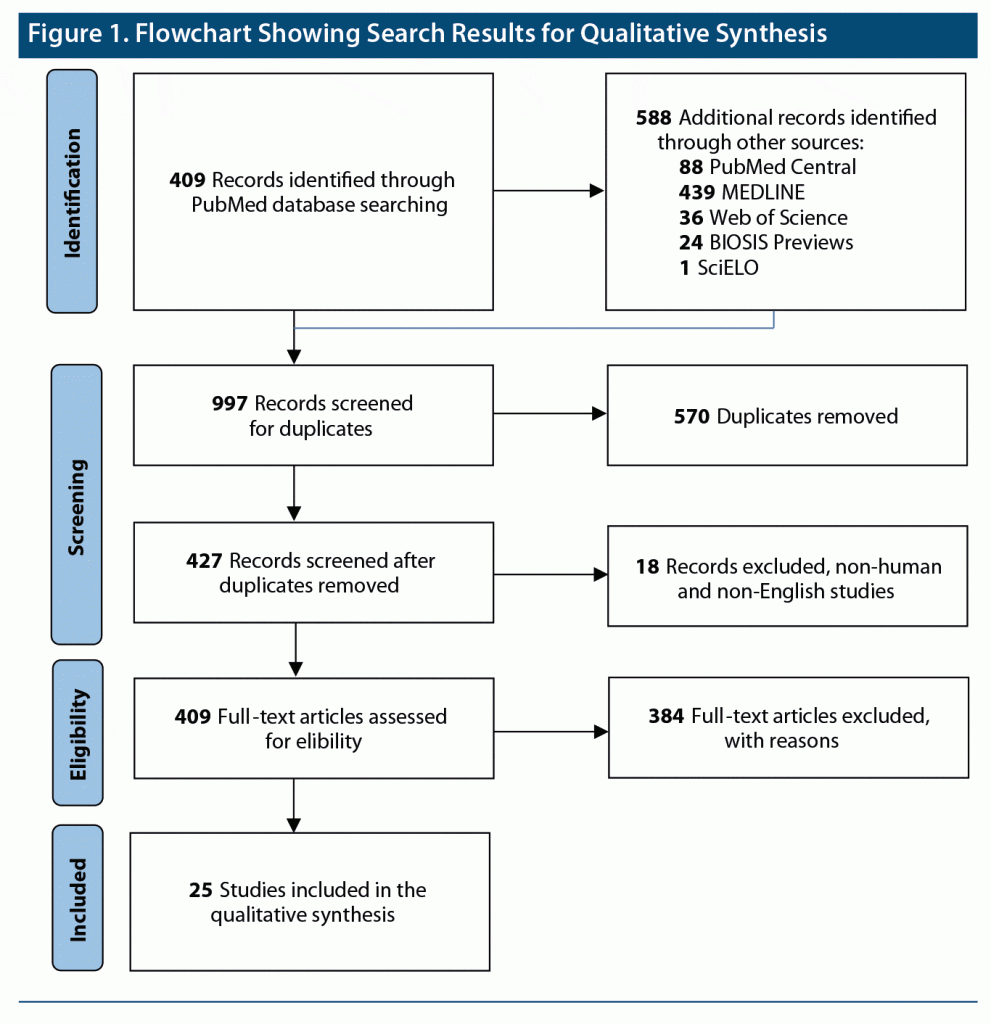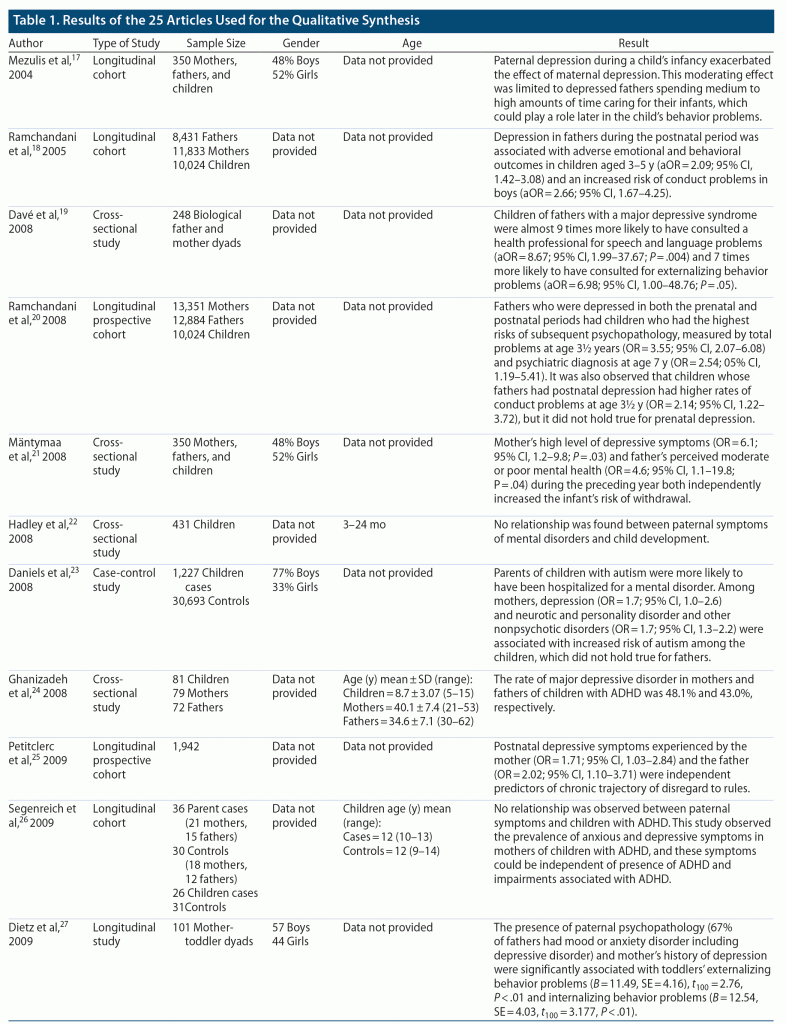ABSTRACT
Objective: To explore paternal depression (before, during, and after pregnancy) and its association with neurodevelopmental disorders in children.
Data Sources: A systematic, English-language review was conducted in PubMed, PubMed Central, MEDLINE, Web of Science, BIOSIS Previews, and SciELO. All relevant literature published from inception to March 31, 2021, was included. The MeSH terms used in the search included paternal behavior, fathers, or father-child relations in the context of depression, postpartum depression, and neurodevelopmental disorders.
Data Extraction: The PICOS (Population, Intervention, Comparison, Outcomes, and Study design) tool was used to enhance reporting of the findings. Twenty-six articles were included in the review.
Results: Paternal depression during the perinatal period resembles maternal perinatal depression. Early paternal depression has considerable emotional, behavioral, and developmental impacts on their children. Genetic endowment and environmental factors induced by paternal depression-related behaviors may lead to adverse neurodevelopmental outcomes.
Conclusions and Relevance: The findings suggest that paternal depression negatively influences neurodevelopmental disorders in the offspring.
Prim Care Companion CNS Disord 2023;25(1):22r03303
To cite: Ashraf S, Shah K, Vadukapuram R. Impact of paternal depression on child neurodevelopmental outcomes and disorders. Prim Care Companion CNS Disord. 2023;25(1):22r03303.
To share: https://doi.org/10.4088/PCC.22r03303
© 2023 Physicians Postgraduate Press, Inc.
aNorthpointe Psychiatry, Lewisville, Texas
bGriffin Memorial Hospital, Norman, Oklahoma
cOklahoma State University, Tulsa, Oklahoma
dThe University of Texas Rio Grande Valley, Harlingen, Texas
eUniversity of Louisville, Kentucky
fUT Southwestern Medical Center, Dallas, Texas
gBoston Children’s Hospital/Harvard Medical School, Boston, Massachusetts
hTexas Tech University Health Science Center at Permian Basin, Midland, Texas
‡Drs Jain and Mansuri share equal credentials for senior authorship.
*Corresponding author: Sahar Ashraf, MD, Northpointe Psychiatry, 860 Hebron Pkwy, Ste 1101, Lewisville, TX 75057 ([email protected]).
Neurodevelopmental disorders (ND) are disturbances or delays in obtaining skills in various developmental areas such as motor, social, language, and cognition.1 They are a leading cause of morbidity in children in the United States, causing great suffering for patients and their families and placing a higher economic burden on society.2 About 15% of children and adolescents aged 3 to 17 years in the United States are affected by NDs such as attention-deficit/hyperactivity disorder (ADHD), learning disabilities, intellectual disability, cerebral palsy, autism, seizures, stuttering or stammering, moderate to profound hearing loss, blindness, and other developmental delays.3 Males have twice the prevalence compared to females.4 There is an overlap in the presentation of different NDs.1,5
Several studies6–8 have assessed maternal psychiatric disorders such as major depressive disorder (MDD) and their impact on children’s socioemotional and cognitive development and behavioral problems. However, minimal evidence is available regarding paternal psychiatric disorders and their impact on children’s early psychosocial and behavioral development.9
There is mounting evidence that early paternal depression may have considerable emotional, behavioral, and developmental effects on children.9–15 This review aims to explore paternal depression (before, during, and after pregnancy) and its association with neurodevelopmental disorders in children and to identify those infants and children most at risk of developing NDs due to paternal depression.
METHODS
A literature search was conducted in PubMed, PubMed Central, MEDLINE, Web of Science, BIOSIS Previews, and SciELO databases for relevant articles published from inception to March 31, 2021. We used keywords including Medical Subject Headings (MeSH) terms paternal behavior, fathers, or father-child relations in the context of ‘“Depression,” ‘“Depressive Disorder,” ‘“Depression, Postpartum,” ‘“Depressive Disorder, Treatment-Resistant,” OR ‘“Depressive Disorder, Major,” and ‘“Neurodevelopmental Disorders.”
A total of 997 articles were identified. The authors (S.A., B.S., S.J.) independently searched the literature and reconciled any differences to determine the final article count for this qualitative synthesis. After removing 570 duplicates, 427 articles were screened by reading the titles and abstracts of the articles. Eighteen non-English non-human studies were excluded. Further, we reviewed 409 full-text articles beyond the title and abstract; 384 articles did not meet the inclusion/exclusion criteria for this review. Differences among the reviewers (S.A., B.S., S.J.) about inclusion or exclusion of articles were resolved after in-depth discussion and were independently verified by another author (K.S.).
This study complied with the Preferred Reporting Items for Systematic Reviews and Meta-Analyses (PRISMA) guidelines.16 Therefore, we considered the final count of 25 articles17–41 (Figure 1) for the qualitative synthesis (Table 1). We used the PICOS (Population, Intervention, Comparison, Outcomes, and Study design) tool to enhance reporting of systematic review findings: participants (children), interventions (paternal depression), comparison (placebos or without placebos), outcomes (child’s neurodevelopmental outcomes or psychiatric disorders), and study design (prospective, case-control, longitudinal, or cross-sectional).
Inclusion Criteria
- Original prospective, case-control, longitudinal, or cross-sectional.
- Studies that evaluated the impact of paternal depression on a child’s neurodevelopment.
- Publication type: only peer-reviewed journal publications.
Exclusion Criteria
- Study design: studies such as case reports, poster abstracts, narrative reviews, systematic reviews, or unpublished doctoral theses.
- Publication type: non–peered-reviewed articles.
- Studies not focused on the topic of the review.
- Research studies including participants other than humans.
- Articles published in non-English languages.
Mechanism of Action
Andrade42 stated that genetic and environmental factors induced by paternal depression–related behaviors might increase the probability of adverse neurodevelopmental outcomes. Therefore, like maternal mental health, paternal mental health during pregnancy is equally essential and needs to be addressed accordingly.
RESULTS
MDD is a common psychiatric disorder and can result in severe impairments that could interfere with or limit one’s ability to carry out major life activities.19 MDD is a leading cause of disability worldwide and a chief contributor to the overall global burden of disease.43 MDD is associated with a considerable economic burden, with an estimated increase of 21.5% of the economic impact (in the United States, $173.2–$210.5 billion) between 2005 and 2010.44 In 2017, approximately 7.1% of all US adults aged ≥ 18 years had at least one major depressive episode, with a higher prevalence among females (8.7%) in contrast to males (5.3%).9,45 Research has shown that genetic, biological, and environmental features contribute to the observed gender disparities in MDD.46 Certain forms of depression-related problems such as premenstrual dysphoric disorder, postpartum depression, and postmenopausal depression and anxiety associated with changes in ovarian hormones could contribute to the increased prevalence in women.45 The communication styles of individuals with depression have significant consequences for those with the disorder and can affect the well-being of others, mainly the children of depressed parents.10
Paternal Depression
Depression was evident in about 10% of men during the prenatal and postpartum periods and was comparatively higher in the 3- to 6-month postpartum period.11 Paternal depression during the first postpartum year in the community varies from 4% to 25.5%.46 Several potential risk factors can contribute to paternal depression during the postnatal period, such as a history of depression in either parent, marital conflict, low socioeconomic status, and unintended pregnancy.14,47 Prenatal and postnatal maternal depression are reliably the most significant risk factors for depression in fathers after childbirth.48–50 The incidence rate of paternal depression among men whose spouses are having postpartum depression is as high as 24%–50%.19,51 Paternal depression before, during, and after pregnancy is associated with increased offspring risk of autism spectrum disorder (ASD) and ADHD.42 Paternal depression during the postnatal period is also strongly associated with increased rates of oppositional defiant disorder (ODD) or conduct disorder (CD) and increased rates of social difficulties in their children.14
Paternal depression appears to be associated with behavioral and peer relationship problems. In contrast, maternal depression is associated with a broader spectrum of child disturbances.14 For example, severe paternal depression is associated with increased aggression in children from 0 to 4 years of age and delays in behavioral, emotional, and social development in children aged 4 to 5 years.30,42
ADHD, ODD, and CD
A study by Flouri et al40 used the 6-item Kessler Psychological Distress Scale to assess paternal depression. They found a clinically significant association between paternal psychological distress and emotional problems and hyperactivity in boys that was higher than that of girls. Another study34 found that the severity of paternal psychological distress showed a small association with behavioral difficulties in children: B = 0.19 (95% confidence interval [CI], 0.15–0.23), emotional difficulties: B = 0.22 (95% CI, 0.18–0.26), and social functioning: B = 0.12 (95% CI, 0.07–0.16).
Another study39 investigated the association of paternal cyclothymic disorder with ODD symptoms and child CD symptoms of ADHD as assessed by parent and teacher-reported behavior questionnaires, respectively. Paternal cyclothymic disorder was associated with parent-rated ODD (β = 0.09, P = .011) and teacher-rated CD (β = 0.07, P = .012) scores. The Turkish version of the Temperament Evaluation of the Memphis, Pisa, Paris, and San Diego Autoquestionnaire was used to assess paternal depression. This questionnaire covers 5 temperament dimensions: depressive, cyclothymic, hyperthymic, irritable, and anxious temperaments.39
Similarly, a study38 found that paternal ADHD was associated with child ADHD symptoms at age 3 and that management of paternal ADHD can help with the child’s ADHD symptoms. However, another study26 found that depression and anxiety in fathers was not an independent predictor for child ADHD symptoms.
Autism
Autism is a developmental disorder defined by impaired social interaction, communication, and behavior. Parental postnatal depression was associated with emotional and behavioral problems in children at age 3 ½ years (adjusted odds ratio [OR] = 2.09; 95% CI, 1.42–3.08) and was a risk factor for conduct problems in boys (OR = 2.66; 95% CI, 1.67–4.25).18 In addition, other studies have reinforced the association between paternal depression and the risk of ASD and ADHD (OR = 1.68; 95% CI, 1.42–1.99).41
Socioemotional Development
Paternal mental health problems were found to be directly related to social withdrawal in infants (OR = 4.6).21 Children living with a father suffering from depression or other mental illness were found to have a 33%–70% increased risk of developing emotional or behavioral problems.31 Infants of depressed fathers displayed increased crying and hyperactivity. Such infants also had an increased risk of developmental and behavioral disorders.31 In another study,52 school-age children with depressed fathers were found to have double the risk for psychiatric disorders. Parental psychopathology also influences socioemotional development outcomes in children. Paternal ADHD and depression cause increased externalizing and internalizing symptoms in children, thus affecting their overall functioning.36
However, Hadley et al22 found no clinically significant relation between paternal mental health and child development. This relation is essential independently. Thus, in families in which parents have mental health issues, their infants should be screened for social withdrawal. If social withdrawal is observed in an infant, the parents should be screened for mental health issues as well.21
Behavior Problems
A study28 demonstrated that adoptive fathers with depressive symptoms when their child was 9 months old was a risk factor for child externalizing symptoms (P < .10). Additionally, antisocial behavior in children marginally at 9 months (P < .10) and significantly at 18 months (P < .05) was a predictor of depressive symptoms in adoptive fathers.28 Parental depression in the postnatal period is an independent predictor of disruptive behaviors in children (OR = 2.02; 95% CI, 1.10–3.71).25 Paternal depressive symptoms were associated with greater externalizing problems after accounting for maternal depressive symptoms (β = 0.18, P = .01) in a study by Callender et al.32
Laurent et al53 studied the link between child adversity, developmental stability of the hypothalamic-pituitary-adrenal axis, and behavioral problems in adopted kids. Parental psychopathology and stress were related to unstable evening cortisol levels, resulting in externalizing symptoms. However, Van Batenburg-Eddes et al35 found little evidence of the impact of paternal depression on children when adjusting for confounding factors.
Speech and Language Impairment
A study19 revealed that children (aged 4–6 years) of fathers with MDD were 9 times more likely to have speech and language problems (adjusted OR = 8.67; 95% CI, 1.99–37.67; P = .004) and 7 times more likely to have externalizing behaviors (adjusted OR = 6.98; 95% CI, 1.00–48.76; P = .05).
Other Mental and Psychological Outcomes
Both maternal and paternal depression have adverse child outcomes. Marital conflict mediates paternal and maternal depression and child outcomes and is an independent risk. Paternal depression was found to predict total child problems when assessed at age 42 months (OR = 2.20; 95% CI, 1.47–3.28).33 Also, paternal symptoms were positively associated with the diagnosis of behavioral issues in children, though the association was not clinically significant.31
Gutierrez-Galve et al37 studied the direct and indirect effect of paternal depression on children’s psychological problems. They found that paternal depression indirectly mediates a child’s psychological problems by causing marital conflict and a stressful home environment. It also causes maternal depression and mental health issues, which affect childcare. Lastly, paternal depression causes a lack of involvement in childcare and parenting. The total effect of paternal depression on a child’s psychological problems was 0.168 at age 42 months (95% CI, 0.133–0.202; P < .001) and 0.130 at age 81 months (95% CI, 0.098–0.161; P < .001).37
A study by Dietz et al27 compared the impact of maternal depression on a toddler in the presence or absence of paternal psychopathology. The authors27 observed that children had more behavioral problems when their mothers had MDD after childbirth and when fathers met the criteria for a psychological illness. Another study20 found that paternal depression in the prenatal and postnatal periods is more likely to cause problems in children at age 3 ½ years (OR = 3.55) and psychiatric diagnosis at age 7 years (OR = 2.54). However, there was little change in these associations when controlling for maternal depression and other potential confounding factors.20
The moderating effect of paternal depression on maternal depression and child outcomes was explored in a study by Mezulis et al.17 Paternal depression exacerbated the impact of maternal depression when the father spent a medium to high amount of time with the infant.17
Discussion
In this review, we studied the effect of paternal depression on child outcomes. We found that paternal depression in any stage of a child’s development has a negative impact. It affects the child directly and indirectly by causing unfavorable environmental factors for a child’s development and growth. The mental health of fathers, especially MDD in fathers, is associated with the increased distress of infants, affecting their socioemotional development. Children of depressed fathers have shown behavioral disruptions such as externalizing and internalizing behaviors, ADHD, ODD, and CD. There is an increased incidence of ASD in children of fathers with depression. Paternal depression has been shown to impact speech and language development. We found an association between paternal mental health and depressive symptoms and neurodevelopmental disorders in infants and children, which adversely impacts their lives and ability to function. This association is not necessarily causative and might be due to common underlying antecedents. Additionally, paternal mental health issues lead to low income, causing poor maternal and infant health.
Paternal mental well-being during prenatal and postnatal care is essential. Both expectant mothers and fathers should be screened for marital conflicts and depression during antenatal care visits at maternity clinics. The couple should be educated on the importance of well-being. Families at risk should be supported and provided access to resources to prevent neurodevelopmental disorders in children.
The collective evidence from this systematic review showed the direct positive relation of paternal depression with mental health and neurodevelopmental disorders in children. This relation was evident in prenatal, antenatal, postnatal, and early childhood phases of development. In addition to the direct effect of paternal depression on a child’s health, there is also an indirect effect on maternal mental health, resulting in poor care of the infant. Depression in fathers causes a hostile home environment and dysfunctional family dynamics, which is detrimental to a child’s mental and physical health. This impact through the home environment was investigated in a study28 in which adoptive fathers’ depression was found to be related to the children’s behavioral outcomes. The results of this review could aid in the design of future research studies exploring paternal mental health outcomes. This review may also encourage maternal health providers, pediatricians, and school counselors to screen mothers and children who are at higher risk for neurodevelopmental problems due to paternal mental health.
CONCLUSION
Treatment of paternal depression could prevent long-term critical effects on a child’s behavior and social and emotional development.29 However, minimal research to date has targeted paternal mental health during the perinatal period.54
Submitted: April 7, 2022; accepted July 21, 2022.
Published online: February 7, 2023.
Relevant financial relationships: None.
Funding/support: None.
Clinical Points
- Paternal depression in any stage of a child’s development has a negative impact.
- An association exists between paternal mental health and depressive symptoms and neurodevelopmental disorders in infants and children.
- Minimal research to date has targeted paternal mental health during the perinatal period.
References (54)

- Jeste SS. Neurodevelopmental behavioral and cognitive disorders. Continuum (Minneap Minn). 2015;21(3 Behavioral Neurology and Neuropsychiatry):690–714. PubMed https://doi.org/
- Hansen BH, Oerbeck B, Skirbekk B, et al. Neurodevelopmental disorders: prevalence and comorbidity in children referred to mental health services. Nord J Psychiatry. 2018;72(4):285–291. PubMed CrossRef
- Magnin E. Neurodevelopmental and neurodegenerative similarities and interactions: a point of view about lifelong neurocognitive trajectories. J Alzheimers Dis. 2021;79(4):1397–1407. PubMed CrossRef
- van Loo KM, Martens GJ. Genetic and environmental factors in complex neurodevelopmental disorders. Curr Genomics. 2007;8(7):429–444. PubMed CrossRef
- Developmental Disabilities Prevalence Trends | CDC. Accessed December 12, 2022. https://www.cdc.gov/ncbddd/developmentaldisabilities/features/increase-in-developmental-disabilities.html
- Goodman SH, Gotlib IH. Risk for psychopathology in the children of depressed mothers: a developmental model for understanding mechanisms of transmission. Psychol Rev. 1999;106(3):458–490. PubMed CrossRef
- Ramchandani P, Psychogiou L. Paternal psychiatric disorders and children’s psychosocial development. Lancet. 2009;374(9690):646–653. PubMed CrossRef
- Maternal depression and child development. Paediatr Child Health. 2004;9(8):575–583. PubMed CrossRef
- Paulson JF, Bazemore SD. Prenatal and postpartum depression in fathers and its association with maternal depression: a meta-analysis. JAMA. 2010;303(19):1961–1969. PubMed CrossRef
- Moses-Kolko EL, Roth EK. Antepartum and postpartum depression: healthy mom, healthy baby. J Am Med Womens Assoc (1972). 2004;59(3):181–191. PubMed
- Paulson JF, Keefe HA, Leiferman JA. Early parental depression and child language development. J Child Psychol Psychiatry. 2009;50(3):254–262. PubMed CrossRef
- Fredriksen E, von Soest T, Smith L, et al. Parenting stress plays a mediating role in the prediction of early child development from both parents’ perinatal depressive symptoms. J Abnorm Child Psychol. 2019;47(1):149–164. PubMed CrossRef
- Ramchandani PG, Stein A, O’Connor TG, et al. Depression in men in the postnatal period and later child psychopathology: a population cohort study. J Am Acad Child Adolesc Psychiatry. 2008;47(4):390–398. PubMed CrossRef
- Kim P, Swain JE. Sad dads: paternal postpartum depression. Psychiatry (Edgmont). 2007;4(2):35–47. PubMed
- NIMH ” Major Depression. NIMH website. Accessed December 12, 2022. https://www.nimh.nih.gov/health/statistics/major-depression.shtml#part_155028
- Moher D, Shamseer L, Clarke M, et al; PRISMA-P Group. Preferred Reporting Items for Systematic Review and Meta-Analysis Protocols (PRISMA-P) 2015 statement. Syst Rev. 2015;4(1):1. PubMed CrossRef
- Mezulis AH, Hyde JS, Clark R. Father involvement moderates the effect of maternal depression during a child’s infancy on child behavior problems in kindergarten. J Fam Psychol. 2004;18(4):575–588. PubMed CrossRef
- Ramchandani P, Stein A, Evans J, et al; ALSPAC study team. Paternal depression in the postnatal period and child development: a prospective population study. Lancet. 2005;365(9478):2201–2205. PubMed CrossRef
- Davé S, Sherr L, Senior R, et al. Associations between paternal depression and behavior problems in children of 4–6 years. Eur Child Adolesc Psychiatry. 2008;17(5):306–315. PubMed CrossRef
- Ramchandani PG, O’Connor TG, Evans J, et al. The effects of pre- and postnatal depression in fathers: a natural experiment comparing the effects of exposure to depression on offspring. J Child Psychol Psychiatry. 2008;49(10):1069–1078. PubMed CrossRef
- Mäntymaa M, Puura K, Luoma I, et al. Infants’ social withdrawal and parents’ mental health. Infant Behav Dev. 2008;31(4):606–613. PubMed CrossRef
- Hadley C, Tegegn A, Tessema F, et al. Parental symptoms of common mental disorders and children’s social, motor, and language development in sub-Saharan Africa. Ann Hum Biol. 2008;35(3):259–275. PubMed CrossRef
- Daniels JL, Forssen U, Hultman CM, et al. Parental psychiatric disorders associated with autism spectrum disorders in the offspring. Pediatrics. 2008;121(5):e1357–e1362. PubMed CrossRef
- Ghanizadeh A, Mohammadi MR, Moini R. Comorbidity of psychiatric disorders and parental psychiatric disorders in a sample of Iranian children with ADHD. J Atten Disord. 2008;12(2):149–155. PubMed CrossRef
- Petitclerc A, Boivin M, Dionne G, et al. Disregard for rules: the early development and predictors of a specific dimension of disruptive behavior disorders. J Child Psychol Psychiatry. 2009;50(12):1477–1484. PubMed CrossRef
- Segenreich D, Fortes D, Coutinho G, et al. Anxiety and depression in parents of a Brazilian non-clinical sample of attention-deficit/ hyperactivity disorder (ADHD) students. Braz J Med Biol Res. 2009;42(5):465–469. PubMed CrossRef
- Dietz LJ, Jennings KD, Kelley SA, et al. Maternal depression, paternal psychopathology, and toddlers’ behavior problems. J Clin Child Adolesc Psychol. 2009;38(1):48–61. PubMed CrossRef
- Pemberton CK, Neiderhiser JM, Leve LD, et al. Influence of parental depressive symptoms on adopted toddler behaviors: an emerging developmental cascade of genetic and environmental effects. Dev Psychopathol. 2010;22(4):803–818. PubMed CrossRef
- Fletcher RJ, Feeman E, Garfield C, et al. The effects of early paternal depression on children’s development. Med J Aust. 2011;195(11–12):685–689. PubMed CrossRef
- Weitzman M, Rosenthal DG, Liu YH. Paternal depressive symptoms and child behavioral or emotional problems in the United States. Pediatrics. 2011;128(6):1126–1134. PubMed CrossRef
- Vidair HB, Reyes JA, Shen S, et al. Screening parents during child evaluations: exploring parent and child psychopathology in the same clinic. J Am Acad Child Adolesc Psychiatry. 2011;50(5):441–450. PubMed CrossRef
- Callender KA, Olson SL, Choe DE, et al. The effects of parental depressive symptoms, appraisals, and physical punishment on later child externalizing behavior. J Abnorm Child Psychol. 2012;40(3):471–483. PubMed CrossRef
- Hanington L, Heron J, Stein A, et al. Parental depression and child outcomes: is marital conflict the missing link? Child Care Health Dev. 2012;38(4):520–529. PubMed CrossRef
- Kvalevaag AL, Ramchandani PG, Hove O, et al. Paternal mental health and socioemotional and behavioral development in their children. Pediatrics. 2013;131(2):e463–e469. PubMed CrossRef
- Van Batenburg-Eddes T, Brion MJ, Henrichs J, et al. Parental depressive and anxiety symptoms during pregnancy and attention problems in children: a cross-cohort consistency study. J Child Psychol Psychiatry. 2013;54(5):591–600. PubMed CrossRef
- Breaux RP, Harvey EA, Lugo-Candelas CI. The role of parent psychopathology in the development of preschool children with behavior problems. J Clin Child Adolesc Psychol. 2014;43(5):777–790. PubMed CrossRef
- Gutierrez-Galve L, Stein A, Hanington L, et al. Paternal depression in the postnatal period and child development: mediators and moderators. Pediatrics. 2015;135(2):e339–e347. PubMed CrossRef
- Breaux RP, Brown HR, Harvey EA. Mediators and moderators of the relation between parental ADHD symptomatology and the early development of child ADHD and ODD symptoms. J Abnorm Child Psychol. 2017;45(3):443–456. PubMed CrossRef
- Bilgiç A, Yılmaz S, Özcan Ö, et al. The relationship between parental affective temperament traits and disruptive behavior disorders symptoms in children with ADHD. J Atten Disord. 2018;22(13):1235–1245. PubMed CrossRef
- Flouri E, Sarmadi Z, Francesconi M. Paternal psychological distress and child problem behavior from early childhood to middle adolescence. J Am Acad Child Adolesc Psychiatry. 2019;58(4):453–458. PubMed CrossRef
- Chen LC, Chen MH, Hsu JW, et al. Association of parental depression with offspring attention-deficit/hyperactivity disorder and autism spectrum disorder: a nationwide birth cohort study. J Affect Disord. 2020;277:109–114. PubMed CrossRef
- Andrade C. Paternal depression as a risk factor for neurodevelopmental disorders in offspring: implications for maternal depression and its treatment during pregnancy. J Clin Psychiatry. 2020;81(6):20f13785. PubMed CrossRef
- Albert PR. Why is depression more prevalent in women? J Psychiatry Neurosci. 2015;40(4):219–221. PubMed CrossRef
- Sloan DM, Sandt AR. Gender differences in depression. Womens Health (Lond). 2006;2(3):425–434. PubMed CrossRef
- Kane P, Garber J. The relations among depression in fathers, children’s psychopathology, and father-child conflict: a meta-analysis. Clin Psychol Rev. 2004;24(3):339–360. PubMed CrossRef
- Scarff JR. Postpartum Depression in Men. Innov Clin Neurosci. 2019;16(5–6):11–14. PubMed
- Deater-Deckard K, Pickering K, Dunn JF, et al; The Avon Longitudinal Study of Pregnancy and Childhood Study Team. Family structure and depressive symptoms in men preceding and following the birth of a child. Am J Psychiatry. 1998;155(6):818–823. PubMed. 10.1176/ajp.155.6.818
- Ballard CG, Davis R, Cullen PC, et al. Prevalence of postnatal psychiatric morbidity in mothers and fathers. Br J Psychiatry. 1994;164(6):782–788. PubMed CrossRef
- Harvey I, McGrath G. Psychiatric morbidity in spouses of women admitted to a mother and baby unit. Br J Psychiatry. 1988;152(4):506–510. PubMed CrossRef
- Rutter M, Caspi A, Fergusson D, et al. Sex differences in developmental reading disability: new findings from 4 epidemiological studies. JAMA. 2004;291(16):2007–2012. PubMed CrossRef
- Narayanan MK, Nærde A. Associations between maternal and paternal depressive symptoms and early child behavior problems: testing a mutually adjusted prospective longitudinal model. J Affect Disord. 2016;196:181–189. PubMed CrossRef
- Gentile S, Fusco ML. Untreated perinatal paternal depression: effects on offspring. Psychiatry Res. 2017;252:325–332. PubMed CrossRef
- Laurent HK, Neiderhiser JM, Natsuaki MN, et al. Stress system development from age 4.5 to 6: family environment predictors and adjustment implications of HPA activity stability versus change. Dev Psychobiol. 2014;56(3):340–354. PubMed CrossRef
- Goldstein Z, Rosen B, Howlett A, et al. Interventions for paternal perinatal depression: a systematic review. J Affect Disord. 2020;265:505–510. PubMed CrossRef
Please sign in or purchase this PDF for $40.
Save
Cite





